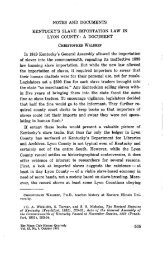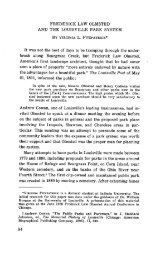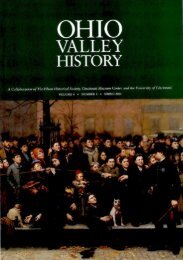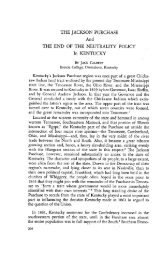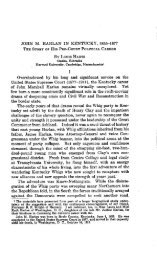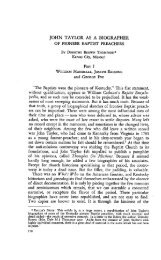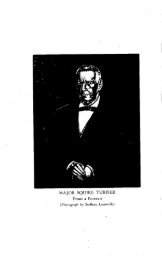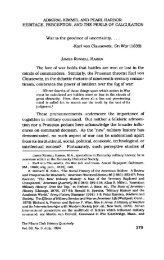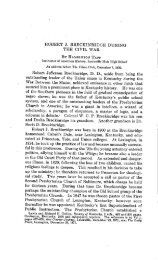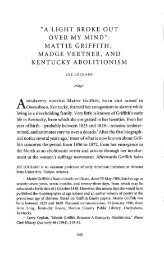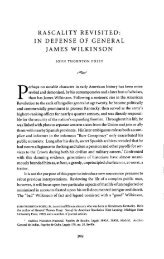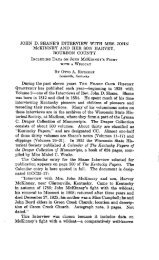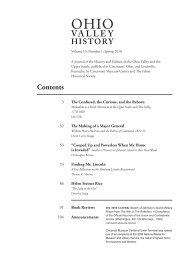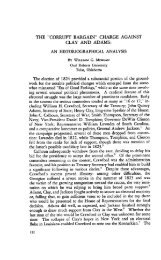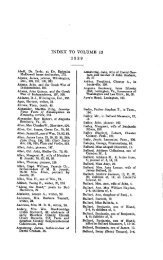Himlerville: Hungarian Cooperative Mining in Kentucky - The Filson ...
Himlerville: Hungarian Cooperative Mining in Kentucky - The Filson ...
Himlerville: Hungarian Cooperative Mining in Kentucky - The Filson ...
Create successful ePaper yourself
Turn your PDF publications into a flip-book with our unique Google optimized e-Paper software.
516 <strong>The</strong> <strong>Filson</strong> Club History Quarterly [October<br />
Because he had worked alongside other <strong>Hungarian</strong> coal m<strong>in</strong>ers<br />
for several years, Himler realized that thousands of his country-<br />
men were employed <strong>in</strong> the <strong>in</strong>dustry. As a former m<strong>in</strong>er Himler<br />
understood the problems <strong>Hungarian</strong> m<strong>in</strong>ers faced and the needs<br />
they had. He realized that they had, <strong>in</strong> the words of Oscar Hand°<br />
l<strong>in</strong>, been "uprooted" <strong>in</strong> com<strong>in</strong>g from Hungary to America and<br />
that they were forced to rel<strong>in</strong>quish an agricultural lifestyle <strong>in</strong><br />
favor of an <strong>in</strong>dustrial one to earn a liv<strong>in</strong>g. 8 Himler also recog-<br />
nized that immigrants were often hapless and destitute. <strong>The</strong><br />
search for economic opportunity and the spirit of <strong>in</strong>dependence<br />
that drove them to America were often ext<strong>in</strong>guished by <strong>in</strong>dus-<br />
trial employment. For months Himler thought about the uprooted<br />
condition of his countrymen as they searched for the American<br />
Dream. Eventually he realized that a solution to the problems of<br />
the uprooted <strong>in</strong>volved comb<strong>in</strong><strong>in</strong>g <strong>Hungarian</strong> culture with ideas<br />
of American <strong>in</strong>dustrialism. As scholars have s<strong>in</strong>ce documented,<br />
Himler knew the importance of immigrant reliance on Old-World<br />
habits, values, and lifestyles to forge a mean<strong>in</strong>gful life <strong>in</strong> Am-<br />
erica. Himler's vision of <strong>Himlerville</strong> was that of a community<br />
that would unite the <strong>Hungarian</strong> peasant's landown<strong>in</strong>g, home-<br />
mak<strong>in</strong>g agricultural <strong>in</strong>st<strong>in</strong>cts with American ideals of <strong>in</strong>dustri-<br />
alism. Although the <strong>Hungarian</strong>s would work <strong>in</strong> <strong>in</strong>dustry (a coal<br />
m<strong>in</strong>e), this work would take place <strong>in</strong> a rural sett<strong>in</strong>g (the hills<br />
of eastern <strong>Kentucky</strong>), on land the immigrants owned. While<br />
coal m<strong>in</strong><strong>in</strong>g was dirty and tir<strong>in</strong>g work, it kept the immigrant<br />
<strong>in</strong> touch with the land much as agriculture had <strong>in</strong> the old coun-<br />
try. Unlike factory employment, which alienated immigrants<br />
issue of this largely <strong>Hungarian</strong>-language paper that was pr<strong>in</strong>ted at <strong>Himlerville</strong>,<br />
<strong>Kentucky</strong>, from 1919 until 1928. <strong>The</strong> paper is on microfilm at the Midwest<br />
lnterlibrary Center <strong>in</strong> Chicago, Ill<strong>in</strong>ois.<br />
8Oscar Handl<strong>in</strong>, <strong>The</strong> Uprooted (Boston: Little, Brown & Company, 1954)<br />
proposes the idea that immigrants were uprooted dur<strong>in</strong>g the transition from the<br />
old country to America. Bagger, "Himler," 147 also states that the <strong>Hungarian</strong>s<br />
were "doubly uprooted."<br />
9 Nelli <strong>in</strong> Italians <strong>in</strong> Chicago demonstrates conclusively that immigrants relied<br />
on Old-World customs to adjust 1o life <strong>in</strong> America.



